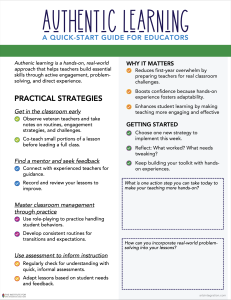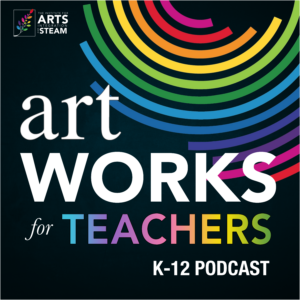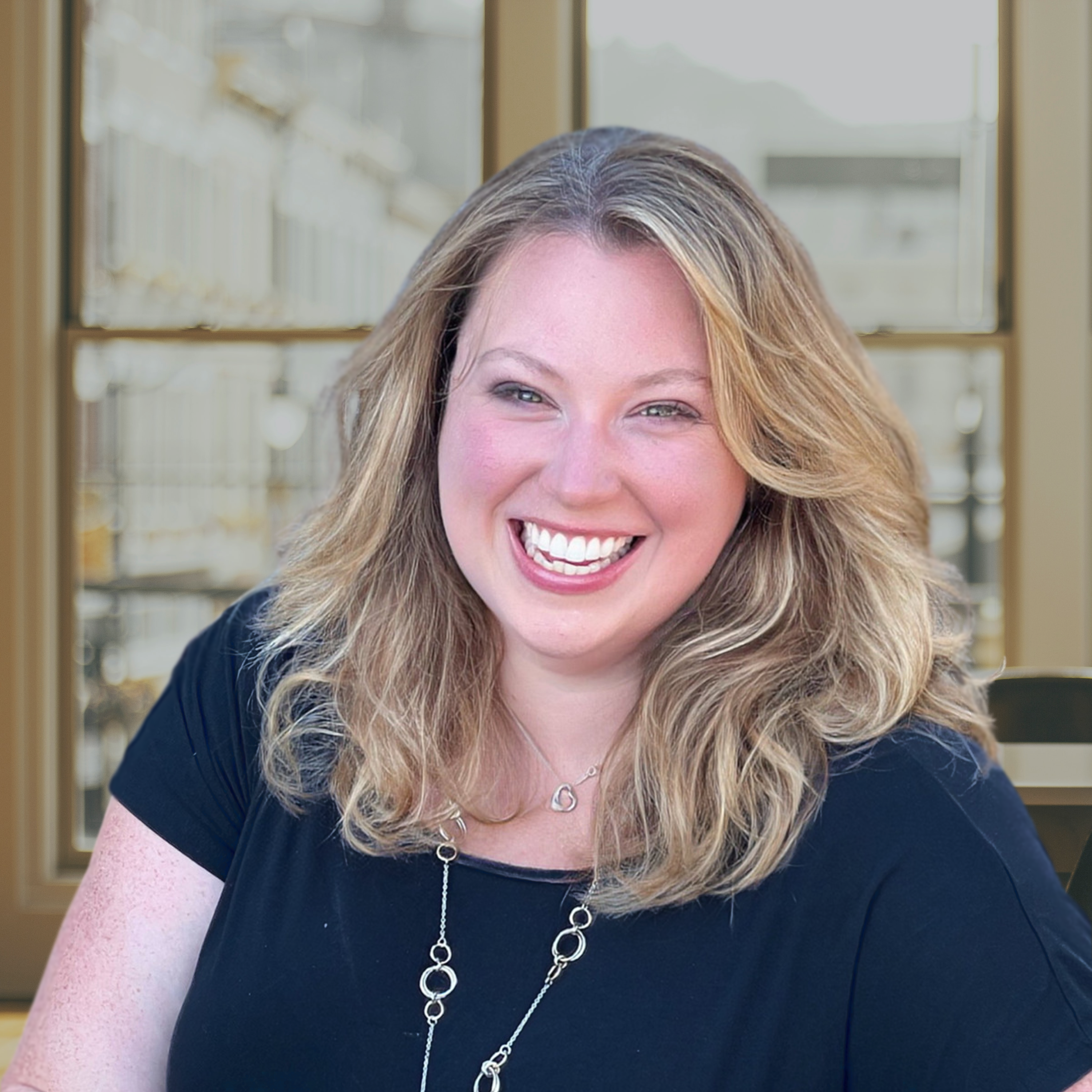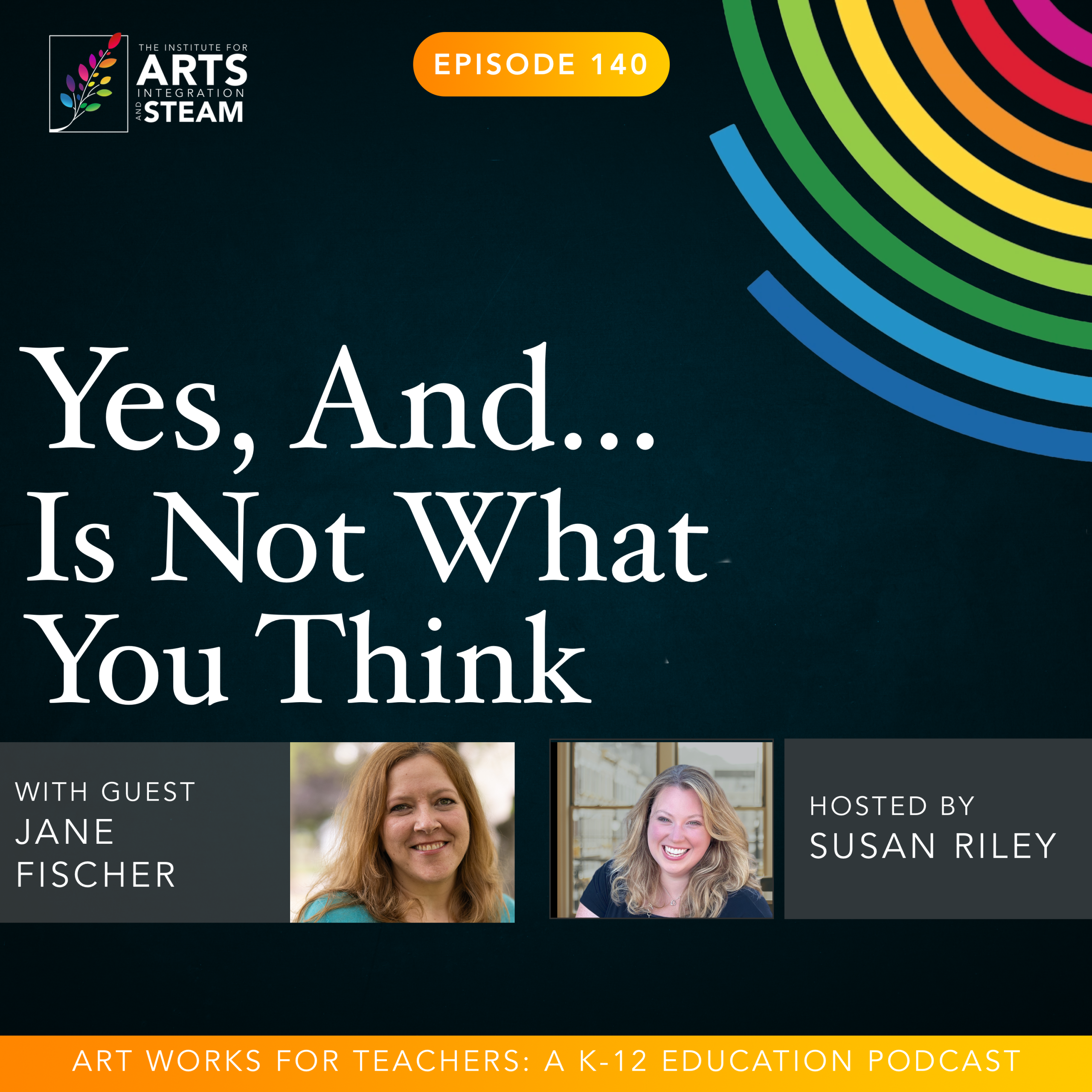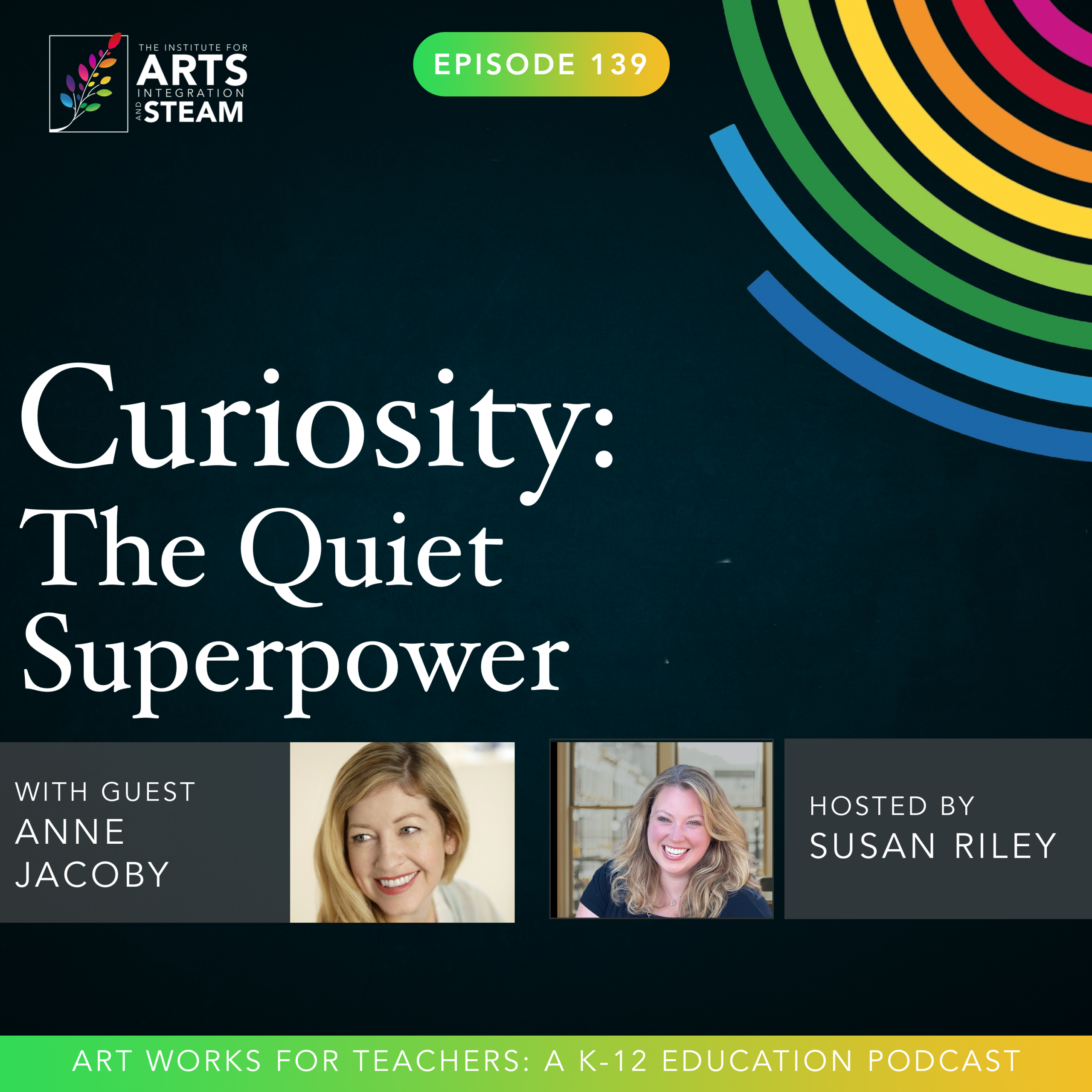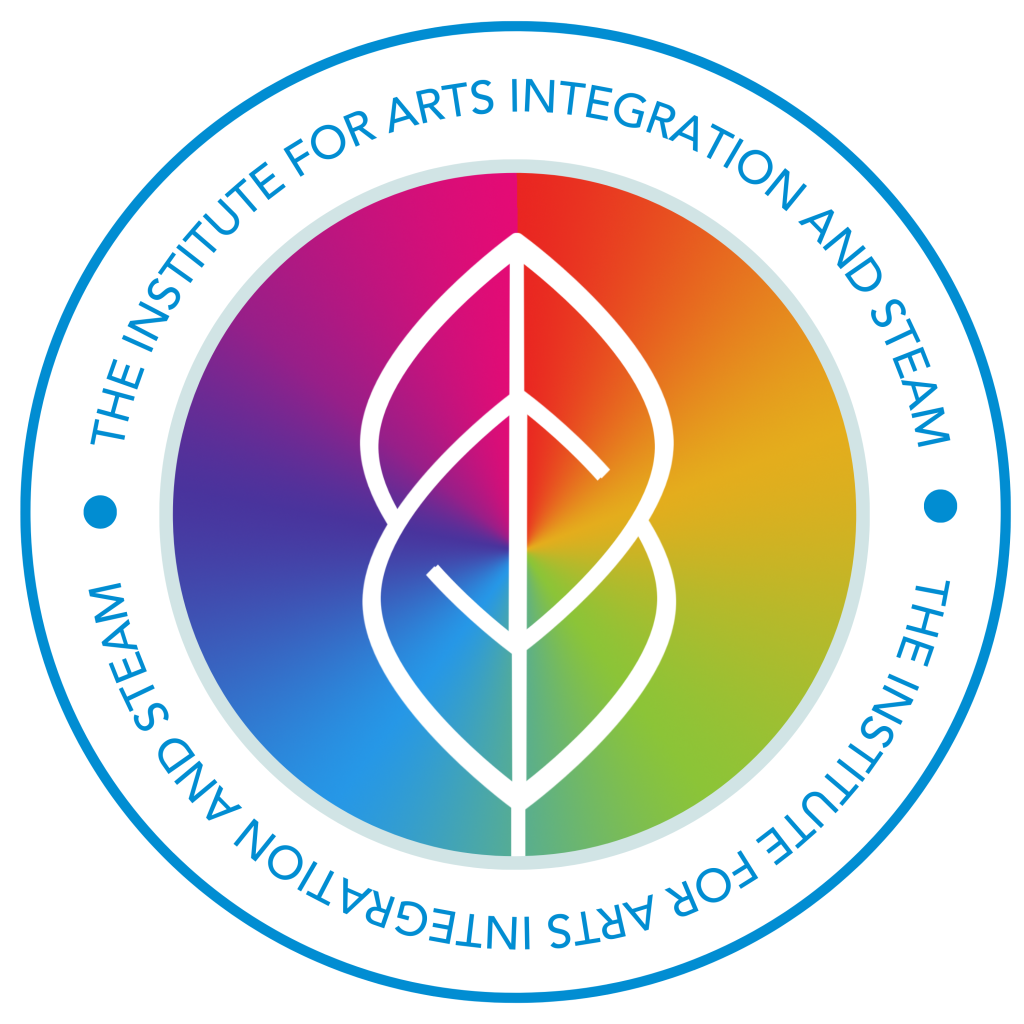ART WORKS FOR TEACHERS PODCAST | EPISODE 123 | 35:31 MIN
The Future of Teaching
Enjoy this free download of the Authentic Learning Quick-Start Guide resource.
Alright, well welcome to the show Kim, I’m so glad you’re here!
Kimberly
Thank you. I’m so glad I’m here too, and I’m glad you’re here.
Susan
Yes, absolutely. We have been, for our audience, we have been trying to get this together for months. And so I’m so excited that I finally get to speak with you and that our audience gets to hear your incredible perspective and story.
Kimberly
Yeah, well, teachers are very equipped to persevere. So I knew it would happen and I’m really, really excited. So thank you.
Susan
Absolutely. So let’s kick off by just telling us a little bit about yourself. Tell us your story.
Kimberly
My story, like which one? My teaching story is my favorite story of all. So I never know whether to start at the beginning and come up or the present and then go back. So we’ll start present. So my current title is I’m the Senior Advisor for Apprenticeship Degrees and Head of Instructional Innovation with craft at WGU, Southwestern Governors University. But I also am so excited because I’m now also working with a school district, which is not uncommon for me. I’ve tended to hold hybrid roles for 16 and a half of 18 years in education. I just can’t seem to quit. So still teaching high school students, coaching teachers, and working on some sort of pet and special projects. Okay, so that’s right now. Working back, so I mentioned this, 16 years of teaching, like the coolest work ever, which is why I can’t quit, I won’t quit. I think at all times I’m trying to like in teacher shortage so can go forward to my classroom, like with the new me and like, just be with with kids until forever. Special education was my jam. I was a social worker before I was a teacher, but I still feel like it’s social work every single day. I was all cert all those years ago. Also taught English, but it’s just one of those things like special education. think every kid deserves an education that’s special for them. So even whenever I was teaching, you English, even whenever I teach teachers, I still think that the education that I strive to provide is special and unique and tailored for kids. Other than that, I love school. I love teachers. Love the opportunity that we have every single day to just be a part of the future and to be in the room truly where it happens.
Susan
Hmm, I love that. Absolutely. So you are multi-passionate, clearly, and have worn so many hats, which, you know, think educators do. I don’t think educators realize how many hats they actually wear until you start to recount, like, I did this, and then I did this, and you’re like, I’ve had like a lifetime of experiences in this short period of time. How have they all influenced your work and your approach to problem solving and problem-based learning for students.
Kimberly
My gosh, yeah. And you’re so right. Like that could be its whole own podcast because, you know, right now it seems like even the work I do, even the titles are quite, I don’t know, corporate, right? But everything I’m good at, I’m good at because I’m a really good teacher. And like, I just want to tell teachers all the time about all the things we do, all the committees we serve on, you know what I mean? So I think it all starts from there. And in that sense, I don’t think I’m very unique because I think that that really is the reality and the opportunity for every great teacher. But of all the different hats that I’ve worn, and it’s so funny when I tell you my goals are teaching, like when I grow up, I wanna be a teacher. Like everything else, like just sort of life got in the way and had me work in different spaces. So at all times, I do feel like everything that I’ve been able to touch and learn is gonna help me, like I said, to bring that forward to my future classroom, honestly.
But the work that I’m doing now in higher ed and then right before this position, I had the opportunity to be the inaugural dean, serve as a dean for almost four years where I designed a job embedded apprenticeship program. I piloted it, I wrote probably, I don’t know, 30 % of the courses. I piloted and designed a clinical program. I taught the clinical program, I staffed it, like all the pieces. But I learned how to do all of these things from being in a school and working as an instructional administrator and being a teacher pretty much the whole time. Cause if you could create phenomenal things in classrooms, you can really create phenomenal things everywhere. It’s like teacher, teacher moves, right? I also spent some time working at the department of education in Louisiana. I was served as the deputy assistant superintendent for educator development. Through that was able to be a part of work with ed prep providers and work around teacher qualities, mentor teachers.
But it just so happens that at the same time I was still working full-time in my district, which teacher time is so different. And I know this sounds like it’s a ton. I’ll never be as busy as I was as a full-time English teacher. Like I’m not taking 180 papers home to grade. Instead I’m just designing lots of programs. But all the work at the department was fueled by the fact that my mornings, I was leaving a campus before I showed up to work. And I think that it just, it hits different whenever you’re involved there. But even that work that I learned in terms of policy in terms of how the division of labor comes down. Like even now, you know, what is the Department of Education nationally? What is my role as a state department? What was my role as a district leader in the district central office? What is my role as a building leader? And I think that because I’m able to see so many spaces now, it informs so many opportunities that I have, but it also gives me a lot of empathy for all of the different fears, for all of the different challenges and obstacles that go into decision making or go into the moments where we don’t make decisions that perhaps we should when we should. And I think that it just makes me a much more well-rounded problem solver. At least I hope that it does. And I still have so much to learn.
Susan
100%. I have so many questions. So just based on all of the experiences that you’ve shared, but I want to ping into the piece about higher education where you are now. Additionally, because I think you’ve had that state level component, you know, a lot of the ins and outs with policy. I think with where we are right now with the Department of Ed and the government as a whole, I higher ed is a conversation that we have not had enough dialogue surrounding, particularly about how it’s impacting both the teacher shortage that is the reality, but also the kids that are going to higher ed and is higher ed as relevant as it used to be? How is it changing? How is the technology that’s emerging impacting higher ed and how is our policy impacting all of that? And I’m wondering, do you have some insights about that because it’s an important piece we don’t talk about often enough.
Kimberly
Yeah. Well, I will say, will answer with humility and I’ll answer obviously only from the view or the truth that I have been a part of. So someone else’s truth is theirs and I honor that. I think that yes, higher education is more relevant now than it’s ever been. I think what’s more relevant than the relevance is that the ability for people to access it is more relevant now than it ever has been. I think that higher education is more relevant now than it’s ever been, but I think more relevant than that, especially now, is the ability for people to access that. I think that trumps all the relevancy. Information and learning is never gonna be the problem, but allowing people to access it and make meaning, that’s always going to be the solution. So that’s what I have to say about that piece. Whenever it comes to teacher preparation, I do think that that is changing. I started to work again with many of the hats, because another thing I did, you know, a little side part is that I started a grow your own program in Louisiana where I was still an all day teacher and then ended up just really blowing up and that program was Educators Rising.
I realized then that whenever it comes to just recruiting, the barriers, the challenges, things that I just had no idea whenever I embarked on that as a teacher. Because as a teacher, at the four walls of my classroom, that was my world, right? And you just start to learn so much more. But the thing is, I always get this, how do we know that apprenticeship is going to work? How do we know that grow your own programs? How do we know that Educators Rising is going to work?
The thing is, and now, you know, I’m five years in, I have data now, I have proof points to show that these things work. But even then I was like, well, I could show you what doesn’t work. I could show you how all the other things have gotten us here. And that I knew from my classroom, right? I didn’t know why, but I knew that something wasn’t working. Whenever you’re pulling people into a pipeline and they’re leaving within the first five years in droves, that is not a failure of that person. And because I’ve coached teachers for so long and I have that compassion and that empathy and I’m a very good coach by the way. I mean, people deserve integrity and I think that whenever you have people entering a field and their passions and their dreams that a lot of them have held for a long time, all the things that they wanna do in education, all the things they’re trying to change and then they go into debt to get this four year education and then within the first few months of the job, they’re like, this isn’t for me, I can’t do this, there’s something wrong with me. I think there’s something wrong with that.
We’re clearly not preparing people in adequate ways if they feel like there’s something fundamentally broken in themselves. Because people don’t tend to quit because of kids. They quit because of the things they can’t change. They quit because of sort of moral injury. And I don’t even like that we say that they burn out because there’s nothing wrong with that candle. They’re going to put that light in a different field if we don’t train them and if we don’t retain them in better ways than we have. So I do think authentic learning is it’s true for kids. It’s true for adults That the more authentic we can make These experiences far before clinical years happen I think the more prepared teachers will be because great teachers don’t fall out of the sky It takes us years to develop that skill set
Susan
Yeah, so powerful and you’re absolutely right. I mean, I think your insights into the teaching profession, but also how we’re preparing them and that it’s not their fault. think that’s, people feel that way all the time. They do, they take that ownership on themselves as teachers and I think this is, it’s incredible that we can recognize it. What are some ways in your experience that we can turn that ship around a little bit? How can we address that head on? And what are some examples that you might be able to provide on ways that we can do that for teachers in a realistic way?
Kimberly
Yeah, and I could give you more macro things that lots of folks are doing really well and that I’ve seen impacted. And then I’ll just give you like, Kim thoughts, which should take that with a grain of salt, totally. But I think first, whenever it comes to, again, access, right? The best thing we can do is remove barriers because I don’t buy it that people don’t want to be teachers. I think they don’t want to be teachers and go into lifelong perpetual reincarnated debt. Like literally I’ll be on my fourth go-around on this planet and I’ll still be paying off my student loans. And I think that that, no, we cannot, that just can’t be the plan, right? I think that removing barriers, think that allowing more opportunities for people to just to shoot their shot, just try, that’s important. And so to that kind of an umbrella like sort of early recruitment, early identification of students who make great leaders, who have sort of some of the inherent talents that teachers have, which all talents can be taught, I believe that, or I wouldn’t be a teacher. But there are some things that we know great teachers really do well. We problem solve, right? We’re creative. We think out of the box we’re able to synthesize information very quickly. Like they’re actually things. If we take a look at like the actual attributes of great teachers that aren’t necessarily easily or readily taught, collaboration, pro, just all of it. God, I love us so much. We’re so good. but there’s no one person or one look or one being that holds the market on that. And so that’s been something in just my work with teacher recruitment, going to those students who are just going to kill it one day.
Like maybe not today when they’re 16, but give them five years and some training and they’re going to tear it up. and so that has been important. And then you see like apprenticeships. I will sing it from the rooftops. And whenever I say apprenticeships, like with a capital A, that means people who are already in the field, like you don’t have to sell them that school is cool, that these kids are amazing and deserve the best. They’re already in the community. like paraprofessionals, you teachers, AIDS, EL AIDS, janitors.
Give them a shot, right? Give them a shot to get the education they need to be great teachers without having to convince them that the community is worth it, right? They already know, they show up for work at a pretty low paying job every day. And so I’m seeing so much promise there. I’m very excited to be part of work that allows for these job embedded experiences where we’re starting from a different place. Like we’re starting to train them from a place of assets the assets that they know their community has and the assets that I know they have because they’re a part of the community and they’ve been part of school. All right, that was a lot. I’m sorry, I could talk about that all day. Yes. And so to that, think that really promising practices is the way we train. There’s no reason why a person should have to wait till their fourth year of college or their fifth year to step into a class. Like, no, start them sooner. I can’t reiterate enough. It takes years to be a great teacher and a lot of those things can be introduced much earlier, which we’re seeing a lot with grow your own programs again, even as early as, as middle school. And I’m not, I’m not talking about tutoring or decorating the school bulletin board. No, no, no. I can’t decorate a board to save my life. but we can offer them leadership opportunities, opportunities to exercise their voice and agency for school improvement. that’s something a young child can do. Like giving people the sense of community and responsibility to your community.
At our heart, that’s what teachers have. yeah, so starting as soon as we can to really cultivate great talent and interest and elevate the profession. And then my Kim thoughts, because I’m also in a position where I get to practice and pilot a lot. I’ve seen that whenever I’ve introduced into new teacher induction or with new teachers, really concerted opportunities for them to conduct their own action research or for them to lead their own passion projects, they stay longer and they’re confident and you can’t tell them nothing because they start to own it, right? And so just the way that I would teach students, but just in a different way, why can’t a teacher who’s highly trained and who has degrees and certifications, why can’t they pinpoint a problem in their classroom, in their school and then actively work to solve it?
You know, I’ve learned now with my own journey, like I’m working on my dissertation now, that action research is the cool thing, but we do that every day. We test things, we look at data, we apply solutions. And I think that giving teachers the opportunity to see that they are part of the solution, that they are researchers, that their views and their experience, they’re worthy. And they look at problems, they’re going to solve problems in ways that only they can.
And so I’ve been able to like do little fellowships or I’ve been able to put in few like sessions. One of the courses that I wrote from my previous university, it’s all about action research because I thought it was just that important. Because it’s powerful. We’re not powerless. We’re not at the whim of things we can’t control. There’s so much more you can control. And I think helping teachers leverage that and their voice and their resources in ways that they never have before. It makes them much more active advocates and not so much passive. And I think that that’s gonna alleviate a lot of the frustration because you’re not as frustrated when you don’t feel that things are being done to you. You feel very powerful when you feel like things are being done with you or because of you.
Susan
Yeah, yeah, no, we see that a lot. have two micro-credentials that are completely action-based. It’s action research-based, and they’re through the difficult things, the things that teachers often struggle with, right, which is classroom management and student engagement and assessment. one of the, like, we’ve done typical courses, and I love our courses, but I think one of the most powerful and most underrated things that we offer as well as others, know NEA offers them, universities offer them, is the ability to do some action research in your own classroom and have that count towards your training because it is, it should be part of your training and you’re owning the work. And I think you’re 100 % about on, I think we definitely need more of that for our teachers. If they’re gonna put in the hours anyway, let’s make it when they’re actually working and they can develop their own systems for things in the areas that they need it most.
Kimberly
Oh yeah, because they have their needs. You know, with some coaching, they can kind of pinpoint it more, but everything from testing out, you know, best practice or research-based practices for classroom management, for trying new grouping strategies. But I’ve also seen it where it’s a more seasoned teacher who’s looking for that next thing, but doesn’t want to leave their classroom. So I’ve seen it where, you know, they’re starting family engagement committees. They’re starting like Facebook tutoring programs. Like, oh my- clearly put a teacher in charge of stuff, we can get it done. I think most of all, it starts with where a teacher is. And so, you know, in my next life, I’m going to try to play around with this more, but I’m really excited, Susan, about you even telling me about these micro credentials. Cause yeah, teachers like, I love us more and more every single year. And this is just one of those pieces. And like, we have the audacity to standardize tests on like, whatever. you and I were talking about, action research where they’re researching and implementing because, you know, we’re, we’re a professional practice. We don’t just remember stuff and spit it out.
Susan
Right, yes, absolutely. And empowering those teachers to be able to do that and treat them as the professionals that they truly are. Now you mentioned Educator Rising. I would love to hear more about this program, how you created it, what it does and what it fosters. I think it’s an incredible program that our audience needs to know about.
Kimberly
It’s so exciting. And so I didn’t I didn’t create it. But I did found Louisiana’s affiliation and then scaled that. And that has been just, I don’t know, one of the most fulfilling things that I’ve ever done behind teaching. But so Educators Rising, it actually is quite an old organization, although it’s been rebranded into what that is now. So if people or listeners have heard of PDK International, it is a part of PDK.
And it was future teachers of America before and future educators of America before. So, um, in a very adept move to really cater to the current generation, which we should, we shouldn’t have antiquated, um, ideas that don’t really fit the people we’re trying to recruit, which is a novel idea. Um, but with educators rising, it is a grow your own program. Um, and in terms of CTE, so career and technical education.
It’s a national club, it’s an organization. just like, you know, future home makers of America or, future business leaders of America. But it also offers a curriculum and just a way to help students view the teaching profession. And a focus on diversifying the profession by putting programs in places where there’s already a teacher shortage because more is more, right? A rising tide lifts all boats. If you know you have pervasive teacher shortage in area, put this organization there so you’re recruiting the actual kids graduating from that space. And poof, you now have a diverse teaching profession. So it’s not rocket science and it’s certainly not exclusionary because you’re in spaces that are already hurting the teachers, but have a wealth of future leaders in those spaces.
And so the classes really take the lid off the teaching profession in ways that I think higher ed is starting to do now. They learn a lot more about the needs of students. They learn a lot more about applied practice and best practice and research. But I think more than that, they really start to harness their sense of duty. They look at teaching as a way to truly serve and give back in a community and in our country.
They really start to see the impact of great teachers as more than somebody who just loves math, loves history and stands and gives notes all hour. Instead, they start to see it as somebody who loves students and loves potential and also is really great at breaking down content so that they can be good at it too. So yeah, it’s such an amazing organization. And I will say this.
I never meant to solve all the world’s problems. I never meant to solve all of Louisiana’s teacher shortage. I meant to bring this club to my school. And then I brought it to another school and then I taught a class. So it started so small, which I think again, goes to the power of a teacher. We don’t need to start with, I’m gonna, no, solve one problem in one place with what you have. And, you know, don’t worry about where it could go. Although sometimes it can go quite far.
Susan
Yeah, absolutely, absolutely. So this pipeline almost that you’re kind of cultivating, right, from the students to the teachers to the leadership, I think you’ve seen so much transformation and in fact have written the book Flip the System, right, which is about transforming education. Can you tell us more about the book and what are some of the biggest challenges you think that are facing us currently? And I know that that might change on a daily basis, but right now.
Kimberly
Well, so no, the book, Flip the System US, it’s actually, it’s a collaboration. So it’s many different authors and you don’t necessarily have to read it linearly, which I really love. It’s like a choose your own adventure book. Like just look at the table of contents and dive in wherever you’re interested because some incredible contributors weighed into that book. it’s not, know, my space was about, you know, teacher shortage and solutions and training and how we’re training teachers. But there’s other stuff like really promising and inclusive practices for students who are newcomers or learning English or ways to infuse more practices in the classroom. But it really focuses on just our role within classrooms across America to see ourselves as a huge part of democracy just really finding our voice as teachers and staying centered and anchored on the power that that holds and that we’re working for kids. You know, so the book’s super cool. And then I don’t remember what the second question was that you asked.
Susan
It was about the biggest changes or challenges that you think are facing us right now and how we can empower teachers to move through this.
Kimberly
Okay, I will say this, I’m a realist, all right? Because it might sound sometimes that, like even now I have to give myself pep talks, right? Yes, there are challenges, but you cannot make me believe there’s not solutions. And a lot of this is because historically we have found them and historically teachers have been in the lead of a lot of major changes, like globally and throughout history, um, often in the background, like we do, you know, but, but so, so often teachers have been so entrenched in work that has moved mountains, honestly. So I’m going to talk about problems, but I want to immediately kind of double back to the solutions, which are teachers, right? Uh, and I was sort of jotting this down, but obviously I think big changes, big issues right now is the need to restore and prioritize funding for teachers. This is such a current and relevant conversation. And I know that sometimes it could seem like NAEP scores just came out, although Louisiana’s were really good. Woo-woo, I’m from Louisiana, I’m teaching Louisiana. But it could be disheartening. And for a public to look and see things like that, and they’re like, well, why are we funding these things and we’re not seeing the result? We have to understand that even things like IDEA have never been fully funded, period.
So it’s not, we’re funding so much. We were never funding enough. Teacher shortage is not new. COVID made it sexy. There are spaces, especially where I live and work that have never been fully staffed with highly skilled credentialed teachers. And I think we forget, we see our little slice of America as the only piece there is. But to be a good citizen, you have to think beyond just what’s good for you and your street and your community, right? And so that’s a really important thing increasing Title I funding, understanding that this is important. And we either want all folks to be a contributing, thriving part of our society or we don’t. And we can’t get there without education. And we can’t get there in spaces that have been historically underfunded, marginalized. So that’s one thing. Let’s restore funding and then increase it. Not just give it back, give us more. Like the audacity of me, right?
So that we can actually do our jobs. So that’s, that’s critical. I think in terms of, you know, teacher prep or the way that we assess great teaching, like moving beyond compliance to support, is the same thing. I wouldn’t want to go to a doctor who’s proved the expertise by passing tests. I want to go to a doctor who can keep me alive, preferably without large scars, you know, who can like use current technology and who keeps their practice current. And we so, we forget that teaching is a profession.
And so we cannot have things measuring this growing effervescent, powerful field in ways that fit in multiple choice buckets because we’re too strong. We’re too good for that, right? Like, so I just think things that are in support, that things are diagnostic and then used to train us and strengthen us and make us better. And then definitely ways to help us show what we can do and not talk about what we can do. And I’m someone who can do both. I could talk it, but that’s not what makes me good. I’m good because I have a highly effective skill set. It’s not lip service. And so, yeah, I’m rambling now. I’m going to go back. OK. And then I think moving beyond standardization to authentic learning across the board, whether it’s for teachers, for pre-K students, this world is meant to be lived. And we’re a part of it.
The real world isn’t out there somewhere. No, we’re in it now. And I think that no age group has the market on undeserving experiences that harness their power and allow them to be the hero in their own story. And I think that this all sort of stems from teachers. And what I’m seeing right now, whether it’s the way that we’re recruiting the new generation, whether it’s the way that we are opening up the idea that there’s no one person that should be filling the teaching profession, that there’s space and that we are truly better when we’re represented by very different backgrounds, experiences, perspectives, strengths. We’re getting amazing new people into the profession that are bringing so many different things and we need that. And I think that’s what’s going to keep things moving and keep it all flourishing.
Susan
I so many gems today. So many gems, Thank you so much for sharing your insights. They are wonderful. And I think they’re, they give us so much food for thought in a positive way for moving forward. And that’s, we so desperately need some of those positive solution-based ideas to move us forward. So thank you for bringing that today. Kim, can you share how our audience can stay connected with you and learn more?
Kimberly
I would love a pen pal. I really would. No, social media. So I’m on LinkedIn and I think I’m Kimberly Eckert. I mean, I am, I know I’m Kimberly Eckert, but I think on LinkedIn I’m also Kimberly Eckert. And I will say this, I love hearing from people that are doing powerful work. I’m such a groupie. Like, my gosh.
And so it uplifts me. even if people reach out and they tell me incredible work that they’re a part of, or if they tell me something that they want to do and they’re afraid, like, you’re my coworker, you’re my colleague, and we’re in this together. And, and I will reach out and I will be like, let’s drink wine on a zoom. Let’s figure this out. Because it’s just such a gift to be a part of our teaching community. And I’m thankful for that. So yeah, reach out for sure. And then Instagram.
I feel very VH1, like, washed out that I’m 2018 LaToy. I think a million years ago, but it was my handle then and I’m not social media savvy. So 2018 LaToy is how you can find me.
Susan
We will make sure that both of those are in the show notes for today so that people can stay in touch and continue to learn from you. Kimberly, thank you so much for joining me today and for sharing your insights with all of us.
Kimberly
Thank you so much for having me and for the work that you do and for just being so supportive and excited about teachers. I really appreciate you giving people like me a space to be able to connect with other people.
Susan
Of course, of course. All right, thanks, Kim.
Kimberly on LinkedIn
Kimberly on Instagram

